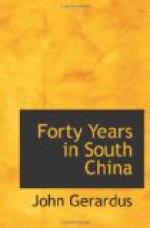“In July last inflammatory placards were extensively posted throughout the region about Canton, stating that foreigners had imported a large quantity of poison and had hired vagabond Chinese to distribute it among the people; that only foreigners had the antidote to this poison and that they refused to administer it, except for large sums of money or to such persons as embraced the foreigner’s religion. In the latter part of July some of these placards and letters accompanying them were received by Chinese at Amoy from their Canton friends. They were copied, with changes to suit this region, and extensively circulated. The man who seems to have been most active in their circulation was the Cham-hu, the highest military official at Amoy under the Admiral. He united with the Hai-hong, a high civil official, in issuing a proclamation, warning the people to be on their guard against poison, which wicked people were circulating. This proclamation was not only circulated in the city of Amoy, but also in the country around.
“It did not mention foreigners, but the people by some other means were made to understand that foreigners were meant. The district Magistrate of the city of Chiang-chiu issued a proclamation informing the people of the danger of poison, especially against poison in their wells. Two days later he issued another proclamation, reiterating his warnings, and informing the people that he had arrested and examined a man who confessed that he, with three others, had been employed by foreigners to engage in this work of poisoning the people.
“Their especial business was to poison all the wells. This so-called criminal was speedily executed.
“A few days afterwards a military official at Chiang-chiu also issued a proclamation to warn the people against poison, and giving the confession of the above-mentioned criminal with great particularity. The criminal is made to say that a few months ago he had been decoyed and sold to foreigners. In company with more than fifty others—he was conveyed by ship to Macao. There they were distributed among the foreign hongs, one to each hong. (Hong is pigeon English for business house.)
“That afterwards he with three others was sent home, being furnished with poison for distribution, and with special direction to poison all the wells on their way. They were to refer all those on whom the poison took effect to a certain individual at Amoy, who would heal them gratuitously, only requiring of them their names. This, doubtless, is an allusion to the hospital for the Chinese at Amoy, where the names of the patients are of course recorded and they receive medicine and medical attendance gratuitously.
“In this confession foreigners are designated by the opprobrious epithet of ‘little’—that is, contemptible—’demons.’ This, by the way, is a phrase never used to designate foreigners in this region except by those in the mandarin offices. Besides the absurdity of charging foreigners with distributing poison, the whole confession bears the evidence not only of falsehood, but, if ever made, of having been put into the man’s mouth by those inside the mandarin offices and forced from him by torture, for the express purpose of exciting the intensest hatred against foreigners.




